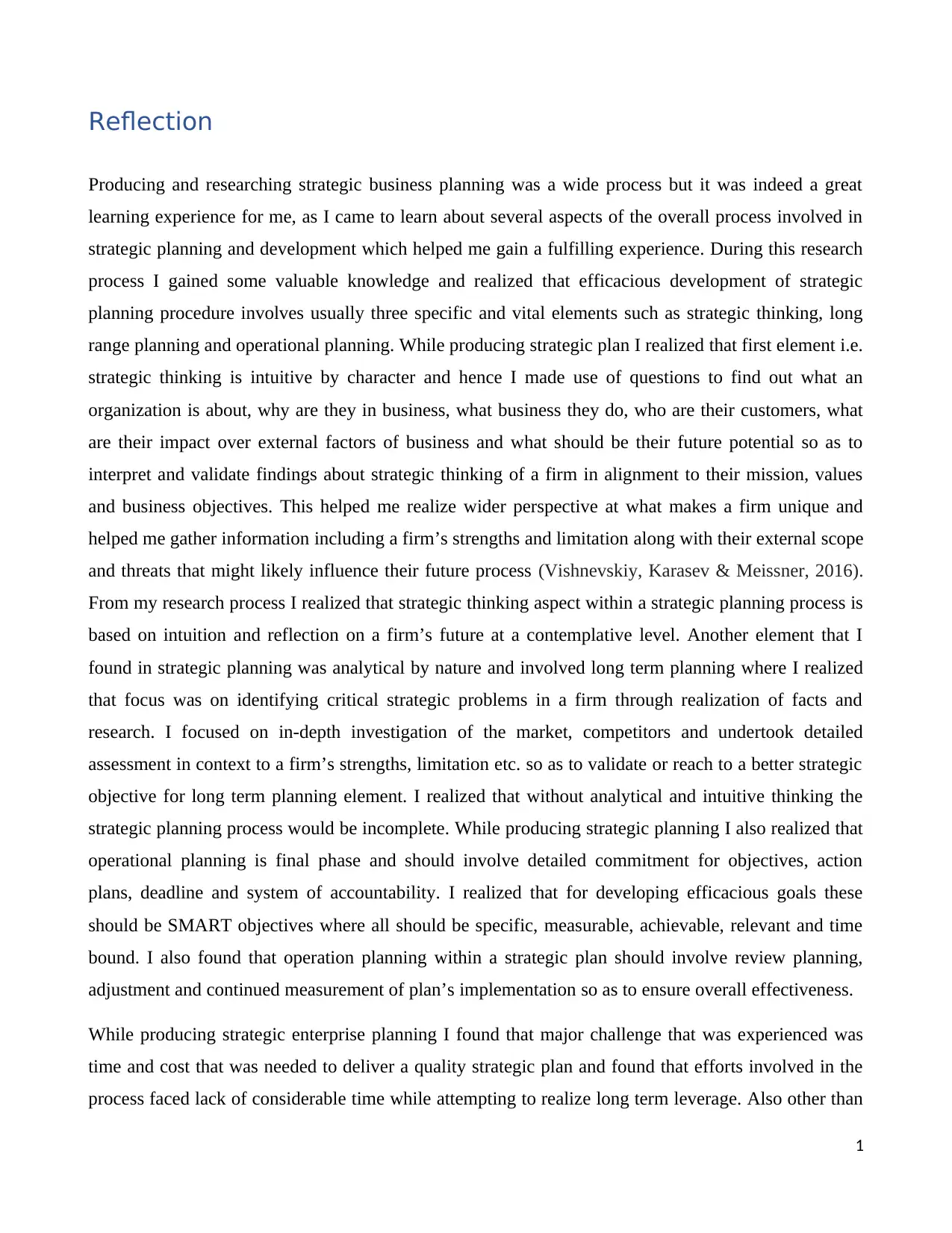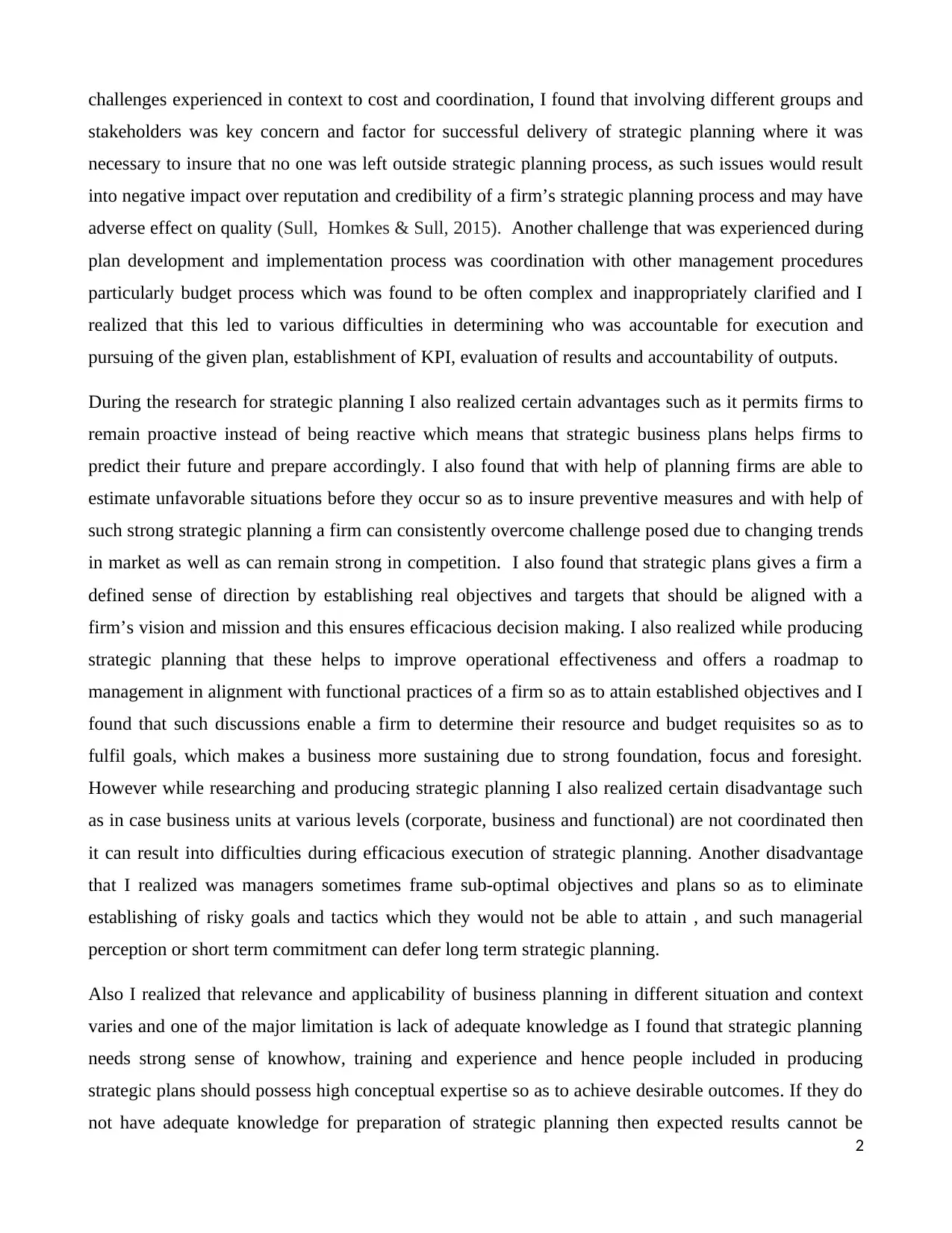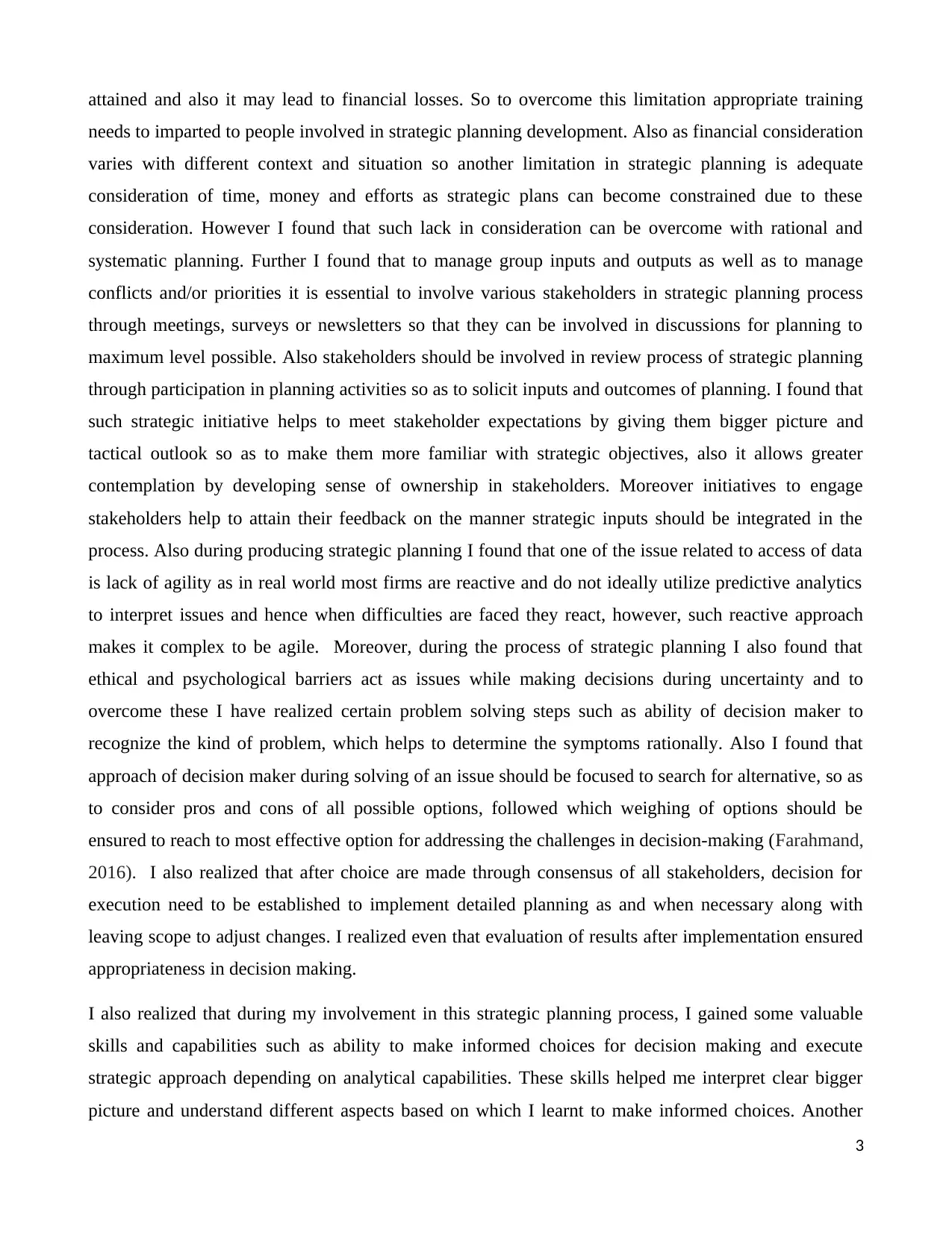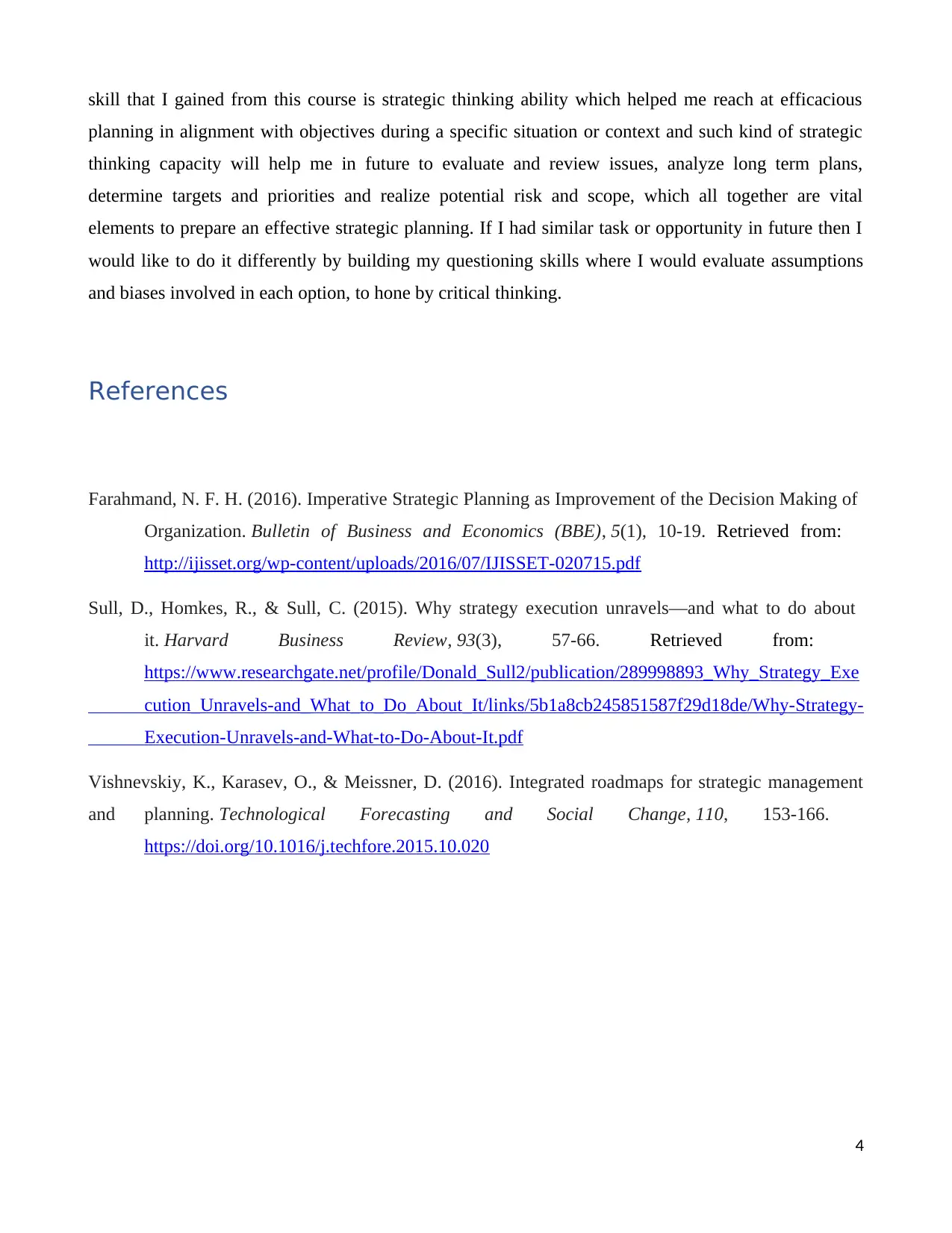Strategic Enterprise Planning: A Reflection Report Analysis
VerifiedAdded on 2023/01/20
|5
|1780
|32
Report
AI Summary
This report provides a comprehensive reflection on the process of strategic enterprise planning. The author discusses the key elements of strategic thinking, long-range planning, and operational planning, highlighting the importance of intuition and analysis. The report details the challenges encountered, such as time constraints, stakeholder coordination, and budget integration. It also explores the advantages of strategic planning, including proactive decision-making and improved operational effectiveness, while acknowledging disadvantages like coordination issues and the need for adequate knowledge. Furthermore, the reflection covers the importance of stakeholder involvement, data accessibility issues, and ethical considerations in decision-making. The author concludes by highlighting skills gained, such as informed decision-making and strategic thinking, emphasizing the value of critical analysis and the ability to evaluate assumptions. References include research on strategic planning and its impact on organizational decision-making and execution.

Strategic Enterprise Planning
NAME OF STUDENT
NAME OF COLLEGE
NAME OF STUDENT
NAME OF COLLEGE
Paraphrase This Document
Need a fresh take? Get an instant paraphrase of this document with our AI Paraphraser

Reflection
Producing and researching strategic business planning was a wide process but it was indeed a great
learning experience for me, as I came to learn about several aspects of the overall process involved in
strategic planning and development which helped me gain a fulfilling experience. During this research
process I gained some valuable knowledge and realized that efficacious development of strategic
planning procedure involves usually three specific and vital elements such as strategic thinking, long
range planning and operational planning. While producing strategic plan I realized that first element i.e.
strategic thinking is intuitive by character and hence I made use of questions to find out what an
organization is about, why are they in business, what business they do, who are their customers, what
are their impact over external factors of business and what should be their future potential so as to
interpret and validate findings about strategic thinking of a firm in alignment to their mission, values
and business objectives. This helped me realize wider perspective at what makes a firm unique and
helped me gather information including a firm’s strengths and limitation along with their external scope
and threats that might likely influence their future process (Vishnevskiy, Karasev & Meissner, 2016).
From my research process I realized that strategic thinking aspect within a strategic planning process is
based on intuition and reflection on a firm’s future at a contemplative level. Another element that I
found in strategic planning was analytical by nature and involved long term planning where I realized
that focus was on identifying critical strategic problems in a firm through realization of facts and
research. I focused on in-depth investigation of the market, competitors and undertook detailed
assessment in context to a firm’s strengths, limitation etc. so as to validate or reach to a better strategic
objective for long term planning element. I realized that without analytical and intuitive thinking the
strategic planning process would be incomplete. While producing strategic planning I also realized that
operational planning is final phase and should involve detailed commitment for objectives, action
plans, deadline and system of accountability. I realized that for developing efficacious goals these
should be SMART objectives where all should be specific, measurable, achievable, relevant and time
bound. I also found that operation planning within a strategic plan should involve review planning,
adjustment and continued measurement of plan’s implementation so as to ensure overall effectiveness.
While producing strategic enterprise planning I found that major challenge that was experienced was
time and cost that was needed to deliver a quality strategic plan and found that efforts involved in the
process faced lack of considerable time while attempting to realize long term leverage. Also other than
1
Producing and researching strategic business planning was a wide process but it was indeed a great
learning experience for me, as I came to learn about several aspects of the overall process involved in
strategic planning and development which helped me gain a fulfilling experience. During this research
process I gained some valuable knowledge and realized that efficacious development of strategic
planning procedure involves usually three specific and vital elements such as strategic thinking, long
range planning and operational planning. While producing strategic plan I realized that first element i.e.
strategic thinking is intuitive by character and hence I made use of questions to find out what an
organization is about, why are they in business, what business they do, who are their customers, what
are their impact over external factors of business and what should be their future potential so as to
interpret and validate findings about strategic thinking of a firm in alignment to their mission, values
and business objectives. This helped me realize wider perspective at what makes a firm unique and
helped me gather information including a firm’s strengths and limitation along with their external scope
and threats that might likely influence their future process (Vishnevskiy, Karasev & Meissner, 2016).
From my research process I realized that strategic thinking aspect within a strategic planning process is
based on intuition and reflection on a firm’s future at a contemplative level. Another element that I
found in strategic planning was analytical by nature and involved long term planning where I realized
that focus was on identifying critical strategic problems in a firm through realization of facts and
research. I focused on in-depth investigation of the market, competitors and undertook detailed
assessment in context to a firm’s strengths, limitation etc. so as to validate or reach to a better strategic
objective for long term planning element. I realized that without analytical and intuitive thinking the
strategic planning process would be incomplete. While producing strategic planning I also realized that
operational planning is final phase and should involve detailed commitment for objectives, action
plans, deadline and system of accountability. I realized that for developing efficacious goals these
should be SMART objectives where all should be specific, measurable, achievable, relevant and time
bound. I also found that operation planning within a strategic plan should involve review planning,
adjustment and continued measurement of plan’s implementation so as to ensure overall effectiveness.
While producing strategic enterprise planning I found that major challenge that was experienced was
time and cost that was needed to deliver a quality strategic plan and found that efforts involved in the
process faced lack of considerable time while attempting to realize long term leverage. Also other than
1

challenges experienced in context to cost and coordination, I found that involving different groups and
stakeholders was key concern and factor for successful delivery of strategic planning where it was
necessary to insure that no one was left outside strategic planning process, as such issues would result
into negative impact over reputation and credibility of a firm’s strategic planning process and may have
adverse effect on quality (Sull, Homkes & Sull, 2015). Another challenge that was experienced during
plan development and implementation process was coordination with other management procedures
particularly budget process which was found to be often complex and inappropriately clarified and I
realized that this led to various difficulties in determining who was accountable for execution and
pursuing of the given plan, establishment of KPI, evaluation of results and accountability of outputs.
During the research for strategic planning I also realized certain advantages such as it permits firms to
remain proactive instead of being reactive which means that strategic business plans helps firms to
predict their future and prepare accordingly. I also found that with help of planning firms are able to
estimate unfavorable situations before they occur so as to insure preventive measures and with help of
such strong strategic planning a firm can consistently overcome challenge posed due to changing trends
in market as well as can remain strong in competition. I also found that strategic plans gives a firm a
defined sense of direction by establishing real objectives and targets that should be aligned with a
firm’s vision and mission and this ensures efficacious decision making. I also realized while producing
strategic planning that these helps to improve operational effectiveness and offers a roadmap to
management in alignment with functional practices of a firm so as to attain established objectives and I
found that such discussions enable a firm to determine their resource and budget requisites so as to
fulfil goals, which makes a business more sustaining due to strong foundation, focus and foresight.
However while researching and producing strategic planning I also realized certain disadvantage such
as in case business units at various levels (corporate, business and functional) are not coordinated then
it can result into difficulties during efficacious execution of strategic planning. Another disadvantage
that I realized was managers sometimes frame sub-optimal objectives and plans so as to eliminate
establishing of risky goals and tactics which they would not be able to attain , and such managerial
perception or short term commitment can defer long term strategic planning.
Also I realized that relevance and applicability of business planning in different situation and context
varies and one of the major limitation is lack of adequate knowledge as I found that strategic planning
needs strong sense of knowhow, training and experience and hence people included in producing
strategic plans should possess high conceptual expertise so as to achieve desirable outcomes. If they do
not have adequate knowledge for preparation of strategic planning then expected results cannot be
2
stakeholders was key concern and factor for successful delivery of strategic planning where it was
necessary to insure that no one was left outside strategic planning process, as such issues would result
into negative impact over reputation and credibility of a firm’s strategic planning process and may have
adverse effect on quality (Sull, Homkes & Sull, 2015). Another challenge that was experienced during
plan development and implementation process was coordination with other management procedures
particularly budget process which was found to be often complex and inappropriately clarified and I
realized that this led to various difficulties in determining who was accountable for execution and
pursuing of the given plan, establishment of KPI, evaluation of results and accountability of outputs.
During the research for strategic planning I also realized certain advantages such as it permits firms to
remain proactive instead of being reactive which means that strategic business plans helps firms to
predict their future and prepare accordingly. I also found that with help of planning firms are able to
estimate unfavorable situations before they occur so as to insure preventive measures and with help of
such strong strategic planning a firm can consistently overcome challenge posed due to changing trends
in market as well as can remain strong in competition. I also found that strategic plans gives a firm a
defined sense of direction by establishing real objectives and targets that should be aligned with a
firm’s vision and mission and this ensures efficacious decision making. I also realized while producing
strategic planning that these helps to improve operational effectiveness and offers a roadmap to
management in alignment with functional practices of a firm so as to attain established objectives and I
found that such discussions enable a firm to determine their resource and budget requisites so as to
fulfil goals, which makes a business more sustaining due to strong foundation, focus and foresight.
However while researching and producing strategic planning I also realized certain disadvantage such
as in case business units at various levels (corporate, business and functional) are not coordinated then
it can result into difficulties during efficacious execution of strategic planning. Another disadvantage
that I realized was managers sometimes frame sub-optimal objectives and plans so as to eliminate
establishing of risky goals and tactics which they would not be able to attain , and such managerial
perception or short term commitment can defer long term strategic planning.
Also I realized that relevance and applicability of business planning in different situation and context
varies and one of the major limitation is lack of adequate knowledge as I found that strategic planning
needs strong sense of knowhow, training and experience and hence people included in producing
strategic plans should possess high conceptual expertise so as to achieve desirable outcomes. If they do
not have adequate knowledge for preparation of strategic planning then expected results cannot be
2
⊘ This is a preview!⊘
Do you want full access?
Subscribe today to unlock all pages.

Trusted by 1+ million students worldwide

attained and also it may lead to financial losses. So to overcome this limitation appropriate training
needs to imparted to people involved in strategic planning development. Also as financial consideration
varies with different context and situation so another limitation in strategic planning is adequate
consideration of time, money and efforts as strategic plans can become constrained due to these
consideration. However I found that such lack in consideration can be overcome with rational and
systematic planning. Further I found that to manage group inputs and outputs as well as to manage
conflicts and/or priorities it is essential to involve various stakeholders in strategic planning process
through meetings, surveys or newsletters so that they can be involved in discussions for planning to
maximum level possible. Also stakeholders should be involved in review process of strategic planning
through participation in planning activities so as to solicit inputs and outcomes of planning. I found that
such strategic initiative helps to meet stakeholder expectations by giving them bigger picture and
tactical outlook so as to make them more familiar with strategic objectives, also it allows greater
contemplation by developing sense of ownership in stakeholders. Moreover initiatives to engage
stakeholders help to attain their feedback on the manner strategic inputs should be integrated in the
process. Also during producing strategic planning I found that one of the issue related to access of data
is lack of agility as in real world most firms are reactive and do not ideally utilize predictive analytics
to interpret issues and hence when difficulties are faced they react, however, such reactive approach
makes it complex to be agile. Moreover, during the process of strategic planning I also found that
ethical and psychological barriers act as issues while making decisions during uncertainty and to
overcome these I have realized certain problem solving steps such as ability of decision maker to
recognize the kind of problem, which helps to determine the symptoms rationally. Also I found that
approach of decision maker during solving of an issue should be focused to search for alternative, so as
to consider pros and cons of all possible options, followed which weighing of options should be
ensured to reach to most effective option for addressing the challenges in decision-making (Farahmand,
2016). I also realized that after choice are made through consensus of all stakeholders, decision for
execution need to be established to implement detailed planning as and when necessary along with
leaving scope to adjust changes. I realized even that evaluation of results after implementation ensured
appropriateness in decision making.
I also realized that during my involvement in this strategic planning process, I gained some valuable
skills and capabilities such as ability to make informed choices for decision making and execute
strategic approach depending on analytical capabilities. These skills helped me interpret clear bigger
picture and understand different aspects based on which I learnt to make informed choices. Another
3
needs to imparted to people involved in strategic planning development. Also as financial consideration
varies with different context and situation so another limitation in strategic planning is adequate
consideration of time, money and efforts as strategic plans can become constrained due to these
consideration. However I found that such lack in consideration can be overcome with rational and
systematic planning. Further I found that to manage group inputs and outputs as well as to manage
conflicts and/or priorities it is essential to involve various stakeholders in strategic planning process
through meetings, surveys or newsletters so that they can be involved in discussions for planning to
maximum level possible. Also stakeholders should be involved in review process of strategic planning
through participation in planning activities so as to solicit inputs and outcomes of planning. I found that
such strategic initiative helps to meet stakeholder expectations by giving them bigger picture and
tactical outlook so as to make them more familiar with strategic objectives, also it allows greater
contemplation by developing sense of ownership in stakeholders. Moreover initiatives to engage
stakeholders help to attain their feedback on the manner strategic inputs should be integrated in the
process. Also during producing strategic planning I found that one of the issue related to access of data
is lack of agility as in real world most firms are reactive and do not ideally utilize predictive analytics
to interpret issues and hence when difficulties are faced they react, however, such reactive approach
makes it complex to be agile. Moreover, during the process of strategic planning I also found that
ethical and psychological barriers act as issues while making decisions during uncertainty and to
overcome these I have realized certain problem solving steps such as ability of decision maker to
recognize the kind of problem, which helps to determine the symptoms rationally. Also I found that
approach of decision maker during solving of an issue should be focused to search for alternative, so as
to consider pros and cons of all possible options, followed which weighing of options should be
ensured to reach to most effective option for addressing the challenges in decision-making (Farahmand,
2016). I also realized that after choice are made through consensus of all stakeholders, decision for
execution need to be established to implement detailed planning as and when necessary along with
leaving scope to adjust changes. I realized even that evaluation of results after implementation ensured
appropriateness in decision making.
I also realized that during my involvement in this strategic planning process, I gained some valuable
skills and capabilities such as ability to make informed choices for decision making and execute
strategic approach depending on analytical capabilities. These skills helped me interpret clear bigger
picture and understand different aspects based on which I learnt to make informed choices. Another
3
Paraphrase This Document
Need a fresh take? Get an instant paraphrase of this document with our AI Paraphraser

skill that I gained from this course is strategic thinking ability which helped me reach at efficacious
planning in alignment with objectives during a specific situation or context and such kind of strategic
thinking capacity will help me in future to evaluate and review issues, analyze long term plans,
determine targets and priorities and realize potential risk and scope, which all together are vital
elements to prepare an effective strategic planning. If I had similar task or opportunity in future then I
would like to do it differently by building my questioning skills where I would evaluate assumptions
and biases involved in each option, to hone by critical thinking.
References
Farahmand, N. F. H. (2016). Imperative Strategic Planning as Improvement of the Decision Making of
Organization. Bulletin of Business and Economics (BBE), 5(1), 10-19. Retrieved from:
http://ijisset.org/wp-content/uploads/2016/07/IJISSET-020715.pdf
Sull, D., Homkes, R., & Sull, C. (2015). Why strategy execution unravels—and what to do about
it. Harvard Business Review, 93(3), 57-66. Retrieved from:
https://www.researchgate.net/profile/Donald_Sull2/publication/289998893_Why_Strategy_Exe
cution_Unravels-and_What_to_Do_About_It/links/5b1a8cb245851587f29d18de/Why-Strategy-
Execution-Unravels-and-What-to-Do-About-It.pdf
Vishnevskiy, K., Karasev, O., & Meissner, D. (2016). Integrated roadmaps for strategic management
and planning. Technological Forecasting and Social Change, 110, 153-166.
https://doi.org/10.1016/j.techfore.2015.10.020
4
planning in alignment with objectives during a specific situation or context and such kind of strategic
thinking capacity will help me in future to evaluate and review issues, analyze long term plans,
determine targets and priorities and realize potential risk and scope, which all together are vital
elements to prepare an effective strategic planning. If I had similar task or opportunity in future then I
would like to do it differently by building my questioning skills where I would evaluate assumptions
and biases involved in each option, to hone by critical thinking.
References
Farahmand, N. F. H. (2016). Imperative Strategic Planning as Improvement of the Decision Making of
Organization. Bulletin of Business and Economics (BBE), 5(1), 10-19. Retrieved from:
http://ijisset.org/wp-content/uploads/2016/07/IJISSET-020715.pdf
Sull, D., Homkes, R., & Sull, C. (2015). Why strategy execution unravels—and what to do about
it. Harvard Business Review, 93(3), 57-66. Retrieved from:
https://www.researchgate.net/profile/Donald_Sull2/publication/289998893_Why_Strategy_Exe
cution_Unravels-and_What_to_Do_About_It/links/5b1a8cb245851587f29d18de/Why-Strategy-
Execution-Unravels-and-What-to-Do-About-It.pdf
Vishnevskiy, K., Karasev, O., & Meissner, D. (2016). Integrated roadmaps for strategic management
and planning. Technological Forecasting and Social Change, 110, 153-166.
https://doi.org/10.1016/j.techfore.2015.10.020
4
1 out of 5
Related Documents
Your All-in-One AI-Powered Toolkit for Academic Success.
+13062052269
info@desklib.com
Available 24*7 on WhatsApp / Email
![[object Object]](/_next/static/media/star-bottom.7253800d.svg)
Unlock your academic potential
Copyright © 2020–2026 A2Z Services. All Rights Reserved. Developed and managed by ZUCOL.




